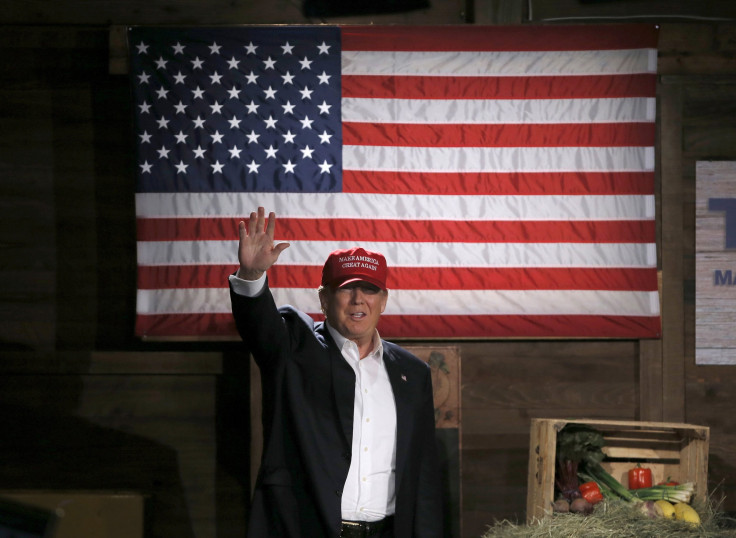Ahead Of Iowa Caucuses, Donald Trump Holds Solid Lead In First 3 Voting States As Clinton, Sanders Battle

There’s no question about it: Donald Trump is conquering the Republican presidential field in the first three states to vote in the 2016 campaign. This includes Iowa, where Texas Sen. Ted Cruz was gaining on him not long ago, according to a new set of NBC News/Wall Street Journal/Marist polls. On the Democratic side, Hillary Clinton holds just a three point lead over Vermont Sen. Bernie Sanders in Iowa, while she is set to take South Carolina, and New Hampshire is set to go to Sanders.
“Trump is positioned to run the house in these first three states. His supporters are committed and plan to turn out,” Lee M. Miringoff, director of the Marist College Institute for Public Opinion, said in a statement. “Will it happen? The answer depends on when or if anti-Trump sentiment will coalesce to interrupt his march to the nomination.”
In the new poll, Trump received 32 percent support in Iowa, leading Cruz by seven points to give the senator 25 percent. The next closest GOP candidate was Florida Sen. Marco Rubio at 18 percent, with everyone else under 10 percent. Trump was the first choice of more than 30 percent of people likely to vote in the first three Republican contests, and he led by double-digit margins in each state.
While Cruz has lost some ground in Iowa from earlier this month when he briefly overtook The Donald in Iowa, he is positioned as Trump’s strongest opponent, coming in second place in each of Iowa, New Hampshire and South Carolina. The success in New Hampshire is particularly surprising, given the state usually favors candidates more moderate than Cruz’s fiery conservatism, and many of the moderate GOPers have been pouring resources there in the hopes of eking out an early state victory.
With just four days until the Iowa caucuses, many of the GOP candidates will be hoping to capitalize on Thursday night’s debate to give them a last-minute boost in polling, particularly because it looks like they will not be competing face-to-face with Trump. After getting into a fight with Fox News, Trump has said he will not attend the debate and will instead hold a rival event. Still, it remains unclear how this will affect voters’ perceptions of the New York billionaire.
For the Democrats, the polls show a mix of dominance in the various early states. Clinton and Sanders remain neck-and-neck in Iowa, with the former secretary of state coming in at 48 percent to Sanders’s 45 percent — a spread within the poll’s 4.6 percent margin of error.
In New Hampshire, Sanders opened up a double-digit lead over Clinton, having gained support from those who self-identify as Democrats. South Carolina, on the other hand, remains a firewall for Clinton. She led Sanders 64 percent to 27 percent there, drawing on her popularity with minority voters. Clinton was up by 57 percent among African-American voters, the poll showed.
The poll also showed that about three quarters of both Sanders and Clinton supporters said they held a high level of commitment to their candidates in Iowa and New Hampshire, going against the perception of an enthusiasm gap that many have reported in the early states.
The Iowa poll was conducted Jan. 24-26, and included interviews with 426 likely Democratic caucusgoers with a 4.6 percent margin of error. It also included 450 likely Republican caucusgoers with a 4.7 percent margin of error.
In New Hampshire, the poll was conducted Jan. 17-23 and included 568 likely Democratic primary voters and 612 likely Republican primary voters. The margins of error were 4.1 percent and 4 percent, respectively.
The South Carolina poll, also conducted Jan. 17-23, included 718 likely Republican primary voters and 446 likely Democratic primary voters. There, the margin of error was 3.7 percent for Republicans and 4.6 percent for Democrats.
© Copyright IBTimes 2024. All rights reserved.






















